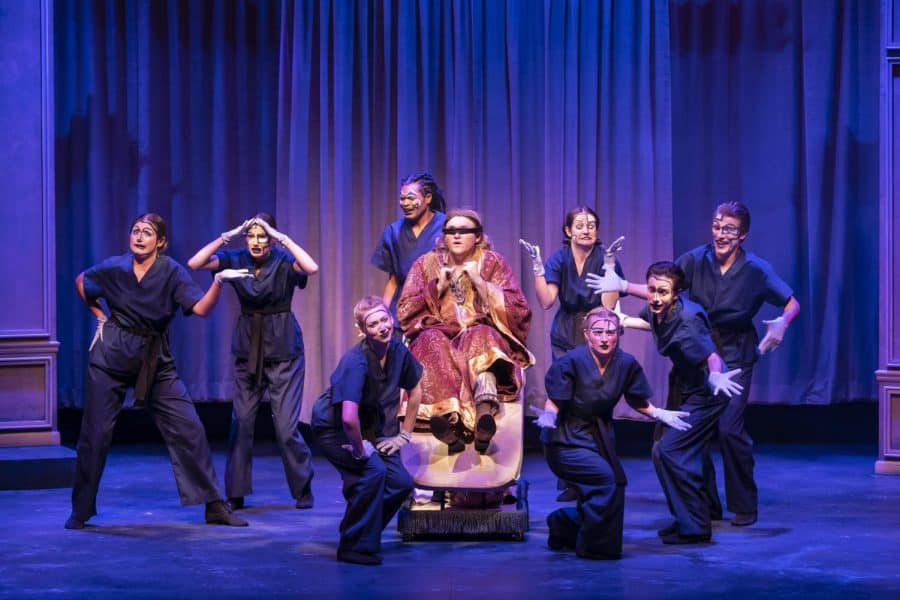Review: “The Imaginary Invalid” and its Lasting Relevance Across the Centuries
November 2, 2022
The most recent production by The University of Alabama Department of Theatre and Dance, “The Imaginary Invalid,” was a packed production, hosting different themes and ideas in its two-hour runtime. Following the department’s production of “Gloria,” “The Imaginary Invalid” ran off-and-on from Wednesday, Oct. 12 to Sunday, Oct. 23 at the Allen Bales Theatre.
A jaunty musical number opened the play, introducing the serious, pertinent themes of the work with the levity and panache that would continue to accompany them all throughout. From its debut in the 17th century, this comedy-ballet always deftly intertwined its important messages about medicine, love and greed with music, dance and revelry for not only broad appeal, but also for the sake of amusement itself, reminding the audience that life can indeed be a joy.
The theatre department delivered exactly that in frequent bouts of modern-day humor delivered by wacky characters without sacrificing the severity of the underlying message.
The director of the play and a professor of movement and acting, Kelley Schoger, also a professor of movement and acting at the University, said the reason she chose to put on “The Imaginary Invalid” is because it’s pertinent to today.
“Molière writes in comedy and farce, and he’s also a social satirist. He was very controversial in his day, and he was a really harsh social critic of his time when he was writing in the late 1600s,” Schoger said. “He was criticizing the medical systems of the time making people sicker. Bloodletting, leeches and animals were foundations of medicine when doctors tried to balance people’s blood in line with the theory of the four humors.”
Despite the play’s 17th century origins, audience members could note the contemporary feel due to the characters’ dialogue, the stage props and the backdrop, all of which were fashioned to deliver a sense of modernity.
The result of the play’s present importance was Schoger’s decision to set the play halfway in the 1600s and halfway in the modern-day.
“Some of the props are modern pill bottles, there’s Toinette’s lab coat and stethoscope, and the curtains are reminiscent of today’s hospital curtains coming up off the floor. There are a lot of hints of modern-day, and that’s because there is a lot to be criticized about today in terms of the pharmaceutical industry, or how we might just treat symptoms instead of causes in terms of sickness,” Schoger said.
None of this is to touch on the emotional core of young love between the characters Angelique and Cleante. Underneath the discussion of medicine and greed is a story of star-crossed lovers who want nothing but to be together when the odds are against them.
Focal is the protagonist, Argan’s, decision to marry Angelique to his doctor’s nephew for unlimited access to the medical treatment the hypochondriac feels he needs. Of course, undermining her own feelings, the play set forth exploring the varying motivations of its cast, from the one-dimensional greed of Argan’s wife, Beline, and his doctor, Doctor Purgeon, to the tired altruism of Toinette, the loyal servant, to the young and romantic Angelique and Cleante.
In the end, virtue wins the day and Argan takes his health into his own hands by becoming, himself, a doctor (in title alone). This is to suggest everybody should be responsible for their own wellbeing and that one should seek betterment in life against languishing misery.
Schoger said the production was not meant to be anti-science or anti-medicine.
“I really wanted to make sure that the play didn’t come across as anti-science or anti-vaccination, because that’s not what it’s about. I think Molière was not arguing against science, but instead arguing against outdated ways of doing things that sought to make people sick in order to make more money,” Schoger said.











